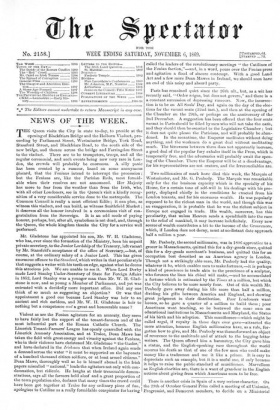Mr. Peabody, the second millionaire, was in 1806 apprentice to
a grocer in Massachusetts, quitted this for a dry-goods store, quitted this for a dry-goods merchant's business, and quitted this for an occupation best described as an American agency in London. Though not a strikingly able man, Mr. Peabody had the quality, whatever it be, which enables men to make fortunes,—it is perhaps a kind of prescience in trade akin to the prescience of a sculptor, who foresees the lines his chisel will make,—and he accumulated a fortune which is estimated by the Times at a million, but which the City believes to be more nearly four. Out of this wealth Mr. Peabody gave away during his life more than half a million, dividing his gifts between America and England, and showing great judgment in their distribution. Poor Llndoners want houses, so he gave a quarter of a million to build them ; poor Americans want teaching, so he bestowed the same sum on educational institutions in Massachusetts and Maryland, the States of his birth and his adoption. This munificence—which might be called regal, if royalty in these days ever gave—attracted the more attention, because English millionaires have, as a rule, for- gotten how to give, and Mr. Peabody was thenceforward an object of reverence to the multitude and of attack to the begging-letter writers. The Queen offered him a baronetcy, the City gave him a statue, and the English-speaking race throughout the world mourns his death as that of one of the few men who could make money like a tradesman and use it like a prince. It is easy to depreciate such an example, but it is a useful one, if only because it helps to raise the public standard of munificence. Marvellous as English charities are, there is a want of grandeur in the English notions about giving from which Americans seem to be free.






























